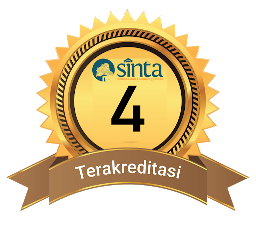Pengembangan Modul Praktikum Kimia Berbasis Problem Based Learning pada Materi Koloid
DOI:
10.29303/cep.v6i2.5674Published:
2023-11-30Issue:
Vol. 6 No. 2 (2023): Edisi NovemberKeywords:
pengembangan, modul praktikum, problem based learning, materi koloidArticles
Downloads
How to Cite
Abstract
This research is a developmental research that aims to determine validity and practicality of chemistry practical work module with problem-based learning in colloid subject for eleventh grade of high school student. The design of the research is 4D (Define, Design, Development, and Dissemination). The sample in this research is 22 students of eleventh grade science two with cluster random sampling technique. The instruments of the research is form of validation sheets and student response questionnaires, while data analysis uses descriptive statistical analysis. The results of this research using the Aiken index (V) is 0.86, reliability is 0.94 and practicality is 86%. Based on the data it can be concluded that the developed practical module is very valid, practical and suaitable to be used in the learning process of chemistry subject.
References
Aji, S.R., Huda, M., dan Risnawati, A. (2017). Pengembangan Modul Fisika Berbasis Problem Based Learning untuk Meningkatkan Kemampuan Pemecahan Masalah Fisika. Science Education Journal, 1 (1), 37-50.
Arifani, D. Y. M., Savalas, L. R. T., Ananto, A. D., Junaidi, E., & Hadisaputra, S. (2021). Pengembangan Modul Praktikum Kimia Berbasis Kimia Komputasi Pada Materi Asam Basa. Prosiding SAINTEK, 3, 660-666.
Gustinasari, M., Lufri., dan Ardi. (2017). Pengembangan Modul Pembelajaran Berbasis Konsep disertai contoh Pada Materi Sel untuk Siswa SMA. Bioeducation Journal, 1(1), 60-73.
Hasanah, T., Huda, C., dan Kurniawan, M. (2017). Pengembangan Modul Pembelajaran Fisika Berbasis Problem Based Learning pada Materi Gelombang Bunyi Untuk Siswa SMA Kelas XII. Physics education journal, 1(1), 58-63.
Hasanah, T., Huda, C., dan Kurniawan, M. (2017). Pengembangan Modul Pembelajaran Fisika Berbasis Problem Based Learning pada Materi Gelombang Bunyi Untuk Siswa SMA Kelas XII. Physics education journal, 1(1), 58-63.
Hidayanti, S. A., Burhanuddin, B., Siahaan, J., & Hakim, A. (2022). Pengembangan Modul Praktikum Kimia Berbasis Problem Based Learning Materi Asam Basa. Chemistry Education Practice, 5(2), 202-207.
Kusuma, B. F. R., Hakim, A., Anwar, Y. A. S., & Junaidi, E. (2021). Pengembangan Modul Praktikum Mandiri Terintegrasi Green Chemistry Pada Pokok Bahasan Asam Basa. Chemistry Education Practice, 4(3), 250-255.
Muldayanti, N., & Awaliyah, N. (2019). Pengembangan Modul Taksonomi Invertebrata pada Proses Pembelajaran Biologi. Jurnal Bioeducation, 6(1), 16-19.
Mustaming, A., Cholik, M., dan Nurlaela, L.. (2015). Pengembangan Perangkat Pembelajaran Memperbaiki Unit Kopling dan Komponen-Komponen Sistem Pengoperasiannya dengan Model Discovery Learning untuk Meningkatkan Hasil Belajar Siswa Kelas XI Otomotif SMK Negeri 2 Tarakan. Jurnal Pendidikan Vokasi: Teori dan Praktek, 3(1), 81-95.
Rahmawati, R., Laksmiwati, D., Al Idrus, S. W., Hakim, A., & Supriadi, S. (2021). Pengembangan Modul Praktikum Kimia Organik I Berbasis Problem Based Learning (PBL) dalam Meningkatkan Keterampilan Sains. Jurnal Pijar Mipa, 16(2), 176-179.
Rokhim, D., Asrori, M., & Widiarti. (2020). Pengembangan Virtual Laboratory pada Praktikum Pemisahan Kimia Terintegrasi Telefon Pintar. JKTP: Jurnal Kajian Teknologi Pendidikan, 3(2), 216-226.
Rosmalinda, D., Rusdy, M., & Haryadi, B. (2013). Pengembangan Modul Praktikum SMA Berbasis PBL (Problem Based Learning). Edu Sains. Vol. 2 (2): 1-7.
Rustaman, N. (2003). Strategi Belajar Mengajar Biologi Edisi Revisi. Bandung: Jurusan Pendidikan Biologi FPMIPA UPI.
Setiyadi, M.W., Ismail., & Hamsu, A.G. (2017). Pengembangan Modul Pembelajaran Biologi Berbasis Pendekatan Saintifik untuk Meningkatkan Hasil Belajar Siswa. Jurnal of EST, 3(2), 104-112.
Sugiyono, (2017). Statistika untuk Penelitian. Bandung: Alfabeta.
Wahyuramdani, S., Wildan., & Hadisaputra, S. (2018). Pengaruh Modul Praktikum Berbasis Problem Based Learning terhadap Hasil Belajar Siswa Kelas X SMA. Jurnal Pendidikan MIPA,1(1), 9- 12.
Yanti, H., Wahyuni, S., Maryani, H., dan Putra, M. (2017). Pengembangan Multimedia Interaktif disertai Drills pada Pokok Bahasan Tekanan di SMP. Jurnal Pembelajaran Fisika, 6(4), 350-353.
Author Biographies
Nadiratul Khairah, Pendidikan Kimia
Syarifa Wahidah Al Idrus, Program Studi Pendidikan Kimia, Universitas Mataram. Mataram, Indonesia
Sunniarti Ariani, Program Studi Pendidikan Kimia, Universitas Mataram. Mataram, Indonesia
License
Copyright (c) 2023 Nadiratul Khairah, Syarifa Wahidah Al Idrus, Sunniarti Ariani

This work is licensed under a Creative Commons Attribution-ShareAlike 4.0 International License.
Authors who publish with Chemistry Education Practice agree to the following terms:
- Authors retain copyright and grant the journal right of first publication with the work simultaneously licensed under a Creative Commons Attribution License 4.0 International License (CC-BY-SA License). This license allows authors to use all articles, data sets, graphics, and appendices in data mining applications, search engines, web sites, blogs, and other platforms by providing an appropriate reference. The journal allows the author(s) to hold the copyright without restrictions and will retain publishing rights without restrictions.
- Authors are able to enter into separate, additional contractual arrangements for the non-exclusive distribution of the journal's published version of the work (e.g., post it to an institutional repository or publish it in a book), with an acknowledgement of its initial publication in Chemistry Education Practice.
- Authors are permitted and encouraged to post their work online (e.g., in institutional repositories or on their website) prior to and during the submission process, as it can lead to productive exchanges, as well as earlier and greater citation of published work (See The Effect of Open Access).






